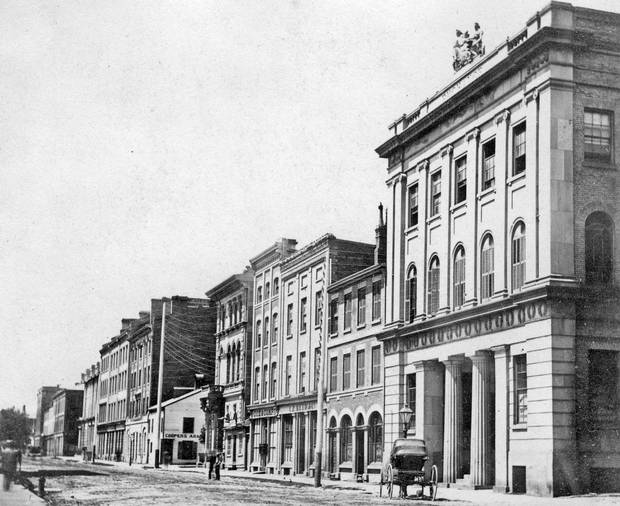The Globe takes issue with Canada's first cabinet

Library and Archives Canada
July 3, 1867 – With the hoopla of Confederation out of the way, The Globe got down to the serious business of criticizing the new federal government's cabinet choices. With 13 ministers, the cabinet was "unreasonably large," the paper said, and much bigger than that of the United States, which had just seven members. Naming four finance-related ministers – a chancellor of the exchequer, receiver-general and two others handling internal revenue and customs – was totally unnecessary, the paper declared. As for the foreign secretary, "what his business is to be, we are utterly at a loss to imagine." Over all, The Globe felt the division of the country's business into "infinitesimal portions" was ludicrous. "It would have been less absurd to have appointed two men to the same office, one to watch the other," it said. "Then, perhaps, the proclivities of Sir John A. Macdonald and his colleagues towards corruption … might have been checked." – Richard Blackwell
Globe adamantly opposes the United States' northern ambitions

Alaska State Library
July 10, 1867 – William Seward, the expansionist U.S. secretary of state, negotiated the purchase of Alaska from Russia in 1867, and had further hopes for American hegemony. He proposed the United States buy Iceland, Greenland, Hawaii and parts of the Caribbean, and thought all of North America should join the United States. The Globe rejected this idea in a July editorial declaring that the North Pole would never belong to the Americans "and still less the intervening country between that delectable spot and the present Northern border of the United States." The people of British America, the paper said, will "stand by the old flag to the last man and to the last cartridge." Fortunately, British Columbia was planning to join Confederation, and that would help Canada "absorb and open up" the prairies, thus creating "a new nationality on this continent, superior, we hope, to that which exists south of the Province line." – Richard Blackwell
Globe publisher launches election bid

Notman & Fraser / Library and Archives Canada
July 17, 1867 – The Globe's publisher, George Brown, was a key figure in the lengthy negotiations that led to Confederation and he was weary after the political battles. But Brown was still the unofficial leader of the Reform party and, in mid-July, 1867, it was announced in the pages of the newspaper that he would reluctantly accept an invitation from his supporters to run in the coming federal election. He would be a candidate in the riding of Ontario South (which included the towns of Oshawa, Whitby and Pickering), against local businessman Thomas Gibbs. Brown expressed confidence he could win, unless "Mr. Gibbs' money bags – and they are very heavy – are more weighty than the principles of the Reformers of South Ontario." The late-summer election proved to be a tight race, but Brown lost, garnering 1,223 votes to Gibbs's 1,292. – Richard Blackwell
Toronto swelters in a heat wave

Octavius Thompson/ Toronto Public Library
July 24, 1867 – Just like today, 150 years ago a summer heat wave was newspaper fodder on a slow news day. On July 24, 1867, Toronto baked in the sun, and The Globe noted the next day that at 3:30 p.m. the thermometer had hit 95 degrees (35 C) in the shade. "It needs no extraordinary amount of proof to say that the heat was excessive, and citizens obliged to face the glare of old Sol's rays during the particularly heated portion of the day had an uneasy time," the report declared. "The city seemed, in fact, a huge Turkish bath, in which unwilling citizens sweltered and groaned from morning till night." In a comment that would be totally unacceptable today, the story said overweight residents were particularly hard hit, with "not one person over a moderate size having been seen during the day." – Richard Blackwell
Railway picnic attacked by rowdies

William Notman/ Courtesy of CNR
July 31, 1867 – The annual summer picnic for employees of the Grand Trunk Railway turned into a disaster in 1867. The event, held in Saint-Hyacinthe, just east of Montreal, was intended for the company's "respectable mechanics and labourers," The Globe reported on July 31. But it was crashed by rowdies who "commenced hustling the wives, daughters and sweethearts who accompanied the employees." The interlopers also tipped over the tubs of drinking water. Order was restored, but later, back at the train station, a full-scale riot erupted with "most fearful scenes of lawlessness," involving stones, bricks and clubs. Most of the windows of the train cars were smashed. Volunteer militia were called out and shots were fired into the train, wounding a woman in the shoulder. The first reports indicated she died, but they were later corrected to say she recovered. – Richard Blackwell



